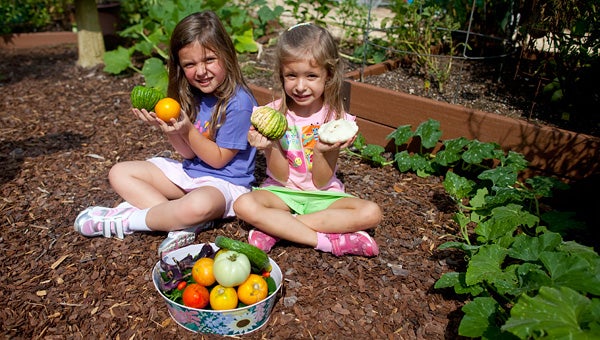Students learn from seed to plate
Published 1:44 pm Monday, August 16, 2010

Hilltop Montessori students in Mrs. Stehr's class Caroline Reddington, left, and Elizabeth Bandura hold freshly picked vegetables from the school's gardens. (Reporter Photo/Jon Goering)
This fall, students at Hilltop Montessori School will learn from the best in the sustainable gardening business as they turn the school gardens into an edible school yard.
Three new gardening beds have been installed and local experts have gotten on board to help the school teach the students about growing food and healthy eating.
Michele Scott, the school’s executive director, said this new program will allow them to take their basic gardens to the next level.
“This will be adding a curriculum piece to the existing gardens,” Scott said. “Kids will go out and pick their own cucumber off the vine, bring it back to the classroom and use it to prepare their own snack. It’s basically teaching them where food comes from. Many of them don’t know. They think it comes from the grocery store.”
The school has partnered with Jones Valley Urban Farms to help with the set up and maintenance of the edible school yard. Their skills and knowledge will help the school with the more advanced aspects of the gardening such as crop rotations, Scott said.
Two local chefs will also be helping out with the program, Chris Hastings from Hot and Hot Fish Club and Chris Harrigan from Stone’s Throw Bar and Grill.
The chefs will come in once a week and design snack recipes the kids can make and enjoy, Scott said.
“Most kids wouldn’t touch a vegetable sitting on a plate,” Scott said. “But if they grow it and harvest it themselves and prepare it into a healthy snack, there’s a better chance of them liking it.”
The school will also attempt to make the program environmentally friendly. They already do composting on site, Scott said. With the new program they will install rain barrels for irrigating the gardens along with using run off water from the air conditioning unit and left over water bottles from lunch. This also cuts down on the school’s water bill.
“We want to run the program in such a way that it’s not harsh on the environment or our pocketbook,” Scott said.
Once the program is up and running, the students will be able to sell extra vegetables to their parents, Scott said.
The next phase of the edible school yard will come with the building of the school’s second building. They hope in the new building they will be able to install a full working kitchen that the students can use to prepare their own lunches.
“We hope in phase two, we can help the working kitchen be replicated in other schools,” Scott said. “We want to show how easily this can be done and how it doesn’t require a large budget.”






